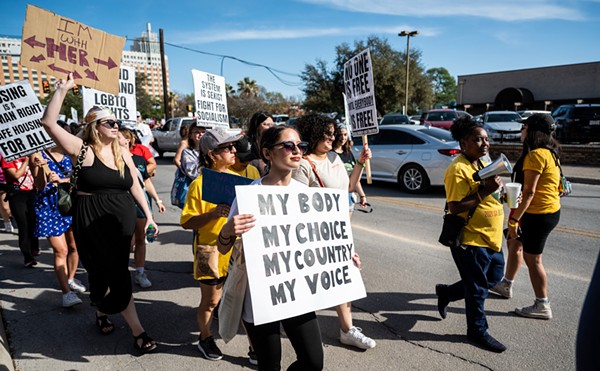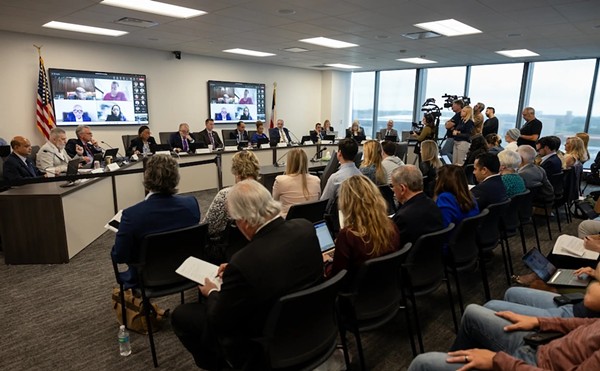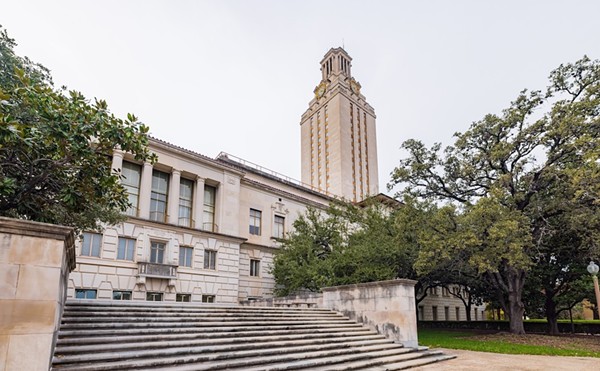Glossy multi-hued butterflies line the path leading to the Morgan's Wonderland gymnasium that sits directly adjacent to an immaculate carousel adorned with ponies, zebras, and the occasional tiger. Inside the gym, the celebration of color continues as violet bleachers and lavender walls with light green accents reflect off a glistening hardwood court. A trio of young athletes zooms about in their pink, purple, and red power chairs using front-mounted, stark white guards to control vibrant exercise balls as Cyndi Lauper's "Girls Just Want to Have Fun" fittingly echoes throughout.
Six-year-old Jada Cano along with sisters Makayla and Mariah Adams, ages 6 and 5, take center court to greet Coach Charles E. Smith and power soccer practice begins. Flanked by a handful of dedicated staff and volunteers, Coach Smith kicks things off with a spirited game of red-light/green-light accentuated by beaming smiles and 360-degree spins. He follows this up with a series of passing and shooting drills where the aspiring futbolistas zip around orange cones and confidently score goals, backed by encouragement and applause from almost everyone in the gym. A friendly game of power soccer-style dodge ball follows and practice concludes with a drill in which each girl takes a crack at playing goalie.
"I feel happy," says Jada after practice, expressing the joy of being out on the court.
This is the brainchild of Gordan Hartman, a former real estate developer who opened Morgan's Wonderland in 2010, offering the region an amusement park oasis for those with disabilities. Hartman named the complex after his daughter Morgan, who lives with severe cognitive delay and served as the inspiration for the park. Today Morgan's Wonderland also serves as the host for the South Texas Regional Adaptive and Paralympic Soccer (STRAPS) program developed over the past year to fill a void for the Alamo City's athletic community. The new program is also supported by the San Antonio Scorpions and the Boeing Company.
"What happens in San Antonio is that we have programs that are too focused," explains Wendy Gumbert, the Sports Director for STRAPS. "We have a lot of adapted sports offered for the military and our wounded service members so there's a lot of opportunity for them. But then the community guy with the physical disability is left out. And then we have programs for kids but it's only for youth so the adults are left out. This program is really meant for everybody, the wounded service members, the kids, the adults, the community, everybody."
Jada goes on to explain that she's been playing soccer for "about a month," her favorite part of the game is "kicking the ball," and like most kids, she had fun watching the Olympics over the summer. Away from sports she's a first grader at Tuscany Heights Elementary, who enjoys coloring, playing with her Barbies, and going out to eat at the Olive Garden.
Jada's family moved to San Antonio about four years ago from the Rio Grande Valley. Her father John is originally from Pharr, her mother Maritza hails from Edinburg, and Jada was born in McAllen. When she was 2 years old her parents noticed that she was walking with an awkward gate and after some lab work she was diagnosed with Spinal Muscular Atrophy. SMA is a disease characterized by missing protein in the spinal cord and there is currently no cure.
"It was very devastating for us as parents with her being our only child," recounts Maritza. "Every day is a challenge for her especially because her main dream is to walk. She asks every day and every night when God's going to give her that ability to walk and be like everyone else. So it's hard for us as parents to see her going through this challenge that God has given to her."
Maritza beams when talking about her daughter, describing her as funny, smart, outgoing, and full of hugs. In addition to soccer, Jada has participated in t-ball and swimming and looks forward to trying basketball and cheerleading. On the power soccer court she is fast, determined, and displays a natural knack for passing and handling the ball.
"Jada's a special girl, as with Makayla and Mariah," says Coach Smith who previously coached Jada in t-ball. "They're what a coach dreams about: An athlete that actually enjoys what they're doing and doesn't give up. She has a great smile, and she plays with a lot of effort and with a lot of passion."
Passion is again on display a week later at Morgan's Wonderland when Coach Willie Jackson holds court for wheelchair soccer, a unique hybrid of basketball, handball, and the beautiful game. The strains of Cyndi Lauper are replaced by bouncing balls, metal wheelchairs clashing, and the occasional grunt. Practice consists of drills centered on developing various skills that are crucial to the game concluding with an increasingly intense scrimmage that places emphasis on using the wheelchairs to set basketball-like picks to free up scorers.
"It's a big difference because there's a lot of different type of strategies for the power soccer," says Coach Jackson explaining the difference between the two sports. "Power soccer is four-on-four with three out on the floor and one goalie and they do more passing than they do dribbling the ball because of the power chair. With the wheelchair soccer it's six-on-six with them being able to use their hands. There's a lot more speed involved, a lot more picking with the chair, and a lot more shots at the goal. So we practice more on picking for each other and getting the more talented shooters with the ball to try to take the shots at the goal."
Holding his own on the hardwood against the adults is 9-year-old Brett McClendon, a 4th grader at Virginia A. Myers Elementary. As his mother Valerie looks on, Brett almost effortlessly dribbles the ball down the court and is easily the most enthusiastic player on the floor. The young athlete speeds along the wing handling and delivering passes to his teammates before taking a turn inside the net. As he waits for the opposition to make it back to his baseline, Brett cuts loose with a kinetic shimmy, his hands and arms moving in rhythm before he blocks shot upon shot.
"Sometimes when you make a goal it feels like you're winning, but it's not about winning and losing, it's just practice," says Brett following the scrimmage. After positive experiences with fencing, baseball, wheelchair tennis, wheelchair basketball, in addition to track and field events, he is eager to dive into a new sport despite his impairment. Brett seems smitten by soccer and reveals that his favorite part of the game is that "you get to challenge yourself and it gets harder and harder."
"Wheelchair sports have definitely improved his confidence," says Valerie proudly. "Especially going to school where other kids sometimes don't really understand. He can show his trophies and his pictures and that kind of lets other kids know 'you guys might think that I can't do things but I can play basketball.' It's just a little bit different."
"Brett is very enthusiastic and a very nice guy," adds Coach Jackson. "I can see him in the future as being one of my very, very big stars on the team. He's got a lot of energy and takes direction well. I just hope to see him continue to come out. If we can get him to come out, we can teach him all the things that he'd like to learn."
With aspirations to one day compete in the Paralympic Games, the second largest sporting event on the planet after the Olympic Games , it's difficult to imagine Brett not returning to master yet another sport. Enchanted by a game where goals come quickly and with fury, he looks right at home.
The next evening at Morgan's Wonderland's S.T.A.R. Soccer Complex, the Paralympic Games are on the mind of another young athlete as he takes the field for Ambulatory Futbol. Draped in full soccer regalia, 16-year-old Daniel Velasquez soaks in the scene as dusk begins to settle on Longhorn Quarry. Bathed by a cloudless sky, the plethora of manicured green fields are dotted with jerseys of all colors, worn by players from all backgrounds and ages. A crisp breeze sweeps through the grounds as scores of youth kick, leap, and shout as they run through specialized drills.
Coach Smith welcomes Daniel to the field and he quickly bursts into motion, a brightly colored ball dancing with his nimble feet. It's not too long before he punctuates the dance with a goal, briefly spreading his arms as if to fly, before pausing to point to the Team U.S.A. shield covering his heart. Beloved at the International School of the Americas he attends, this field for Daniel is unlike any other he has played on due to the inspirational STRAPS program that has embraced him.
"It's so beautiful when you have your family and friends here, and especially at STRAPS, where it's an even playing field," says Daniel glistening with sweat from a fresh run. "Before when I played soccer, I'd kind of feel a little bit down in the back of my mind knowing that I was at a disadvantage from all the other kids. But to be able to come out here to STRAPS and be able to play and know that what I'm doing is level with what everyone else is doing, it's really great."
Daniel began playing soccer at the age of 7 with his brother who does not share the disability that cerebral palsy brings. He fell in love with the pace of the game almost instantly, along with the chemistry with teammates required to succeed. His favorite player is Wayne Rooney of celebrated Manchester United, but unlike Wazza he prefers to roam the midfield.
"The first thing I do is I like to sit down and pray and I just thank God for giving me this day to live," says Daniel describing his pre-game routine. "Then I warm up go out there and do my best and leave the field knowing I gave it everything I could. That's a typical day."
Off the field, Daniel displays an intelligence and humbleness not normally associated with the typical teenage American athlete. His ultimate goal is to reach Brazil and represent the United States at the 2016 Paralympic Games in Rio de Janeiro. Although he cites South African sprinter Oscar Pistorius' historic performance at the recent Olympic Games in London as a major inspiration, he realizes that there is plenty of work to be done to change society's perception of athletes with disabilities.
"I want to disprove a stereotype," says Daniel with conviction. "A lot of people see disabilities and they shun you, they ostracize you. My goal throughout my everyday life is to advocate through the way I interact with other people and just say we're not different. A lot of us are very open to questions so feel free to ask what's wrong. My goal is to live every day to the fullest and to show people that disabilities can actually be abilities in some cases."
Over at the gym Jada is back in motion, rocking a burnt orange Longhorns jersey and practicing with visions of her impending first game as inspiration. Coach Jackson surveys the action from the sidelines contemplating strategies on how he can bring this diverse group of individuals together in a celebration of sports. John and Maritza cheer Jada on, and as she flashes them a smile and a quick wave.
"She really focuses on being a doctor or a nurse, something to help people get better," shares Maritza. "I think she focuses on the health care profession a lot because of her situation. She says by the time she's old enough, she's going to go to college and find a cure for her and everyone else."
As the sun sets on the butterflies, the carousel, and the quarry, Morgan's Wonderland lights up. For those within proximity it serves as a beacon for the true spirit of sports in which the STRAPS program strives to endure. In an era where professional athletes are all too often mired in contracts, controversy, and off-field transgressions, a refreshing change in perspective presented by this local community merits appreciation.
"It's so awesome to come out here and work with a group of guys for one common goal," Daniel exclaims. "You want to go out there and give it your best. If I had to define what's beautiful about it, it's just that feeling you get when you play. You're there, you're giving it your all, and there's nothing better than that. To go out there and glorify our Father in heaven by playing this wonderful game, there's nothing better than that. I guess that's why it's beautiful."
2012 Program Days and Times
Wheelchair Soccer
Free
7-9pm, Tue
Morgan's Wonderland Event Center
5223 Davis Edwards Drive
(512) 914-3152
morganswonderland.com
Through Nov 13
Power Soccer (youth and adults)
6:30-8:30pm, Weds
Morgan's Wonderland Event Center
5223 Davis Edwards Drive
(512) 914-3152
morganswonderland.com
Through Nov 14
Ambulatory/Paralympic Soccer
6:30-8pm, Wed
Star Soccer Complex
5103 David Edwards Drive
(512) 914-3152
morganswonderland.com
Through Nov 14


















